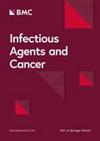感染 SARS-CoV-2 后,血浆 Epstein-Barr 病毒 DNA 对治疗后鼻咽癌患者的影响
IF 3.1
2区 医学
Q3 IMMUNOLOGY
引用次数: 0
摘要
鼻咽癌(NPC)在中国南方很普遍。EBV DNA 是鼻咽癌最有用的生物标志物。然而,EBV DNA在治疗后感染严重急性呼吸系统综合征冠状病毒2(SARS-CoV-2)的鼻咽癌患者中的价值仍不明确。64 名符合条件的鼻咽癌患者于 2022 年 12 月至 2023 年 2 月间入组。符合以下标准的患者被纳入研究:非转移性鼻咽癌、完成根治性治疗、首次感染SARS-CoV-2且EBV DNA从检测不到变为可检测到。随访结束时,81.25%(52/64)的患者被证实未复发,EBV DNA检测不到(未复发)。此外,18.75%(12/64)的患者在持续检测到 EBV DNA 后复发(复发)。在所有64名患者中,从确诊冠状病毒病2019(COVID-19)到检测到EBV DNA的平均时间为35.41天(2至139天)。52名未复发患者从检测到EBV DNA到检测不到EBV DNA的平均时间为63.12天(6至147天)。有复发患者的 EBV DNA 水平高于无复发患者,EBV DNA 的平均水平分别为 1216 拷贝/毫升和 53.18 拷贝/毫升。以 62.3 拷贝/毫升为临界值,EBV DNA 的曲线下面积为 0.88,可用于区分是否复发患者。灵敏度和特异性分别为 81.97%(95% CI 0.71-0.95)和 86.67%(95% CI 0.70-0.95)。对于感染了SARS-CoV-2的鼻咽癌患者,仅靠EBV DNA不足以监测根治性治疗后的复发。目前急需对EBV DNA变化进行长期随访和潜在机理研究。本文章由计算机程序翻译,如有差异,请以英文原文为准。
Impact of plasma Epstein–Barr virus DNA in posttreatment nasopharyngeal carcinoma patients after SARS-CoV-2 infection
Nasopharyngeal carcinoma (NPC) is prevalent in southern China. EBV DNA is the most useful biomarker in NPC. However, the value of EBV DNA in posttreatment NPC patients infected with severe acute respiratory syndrome coronavirus 2 (SARS-CoV-2) remains unclear. Sixty-four eligible NPC patients were enrolled between December 2022 and February 2023. Patients who met the following criteria were included: had non-metastatic NPC, completed radical treatment, were first firstly infected with SARS-CoV-2 and their EBV DNA changed from undetectable to detectable. At the end of follow-up, 81.25% (52/64) of patients were confirmed not to relapse with undetectable EBV DNA (no-relapse). In addition, 18.75% (12/64) of patients experienced relapse with consistent detection of EBV DNA (yes-relapse). For all 64 patients, the average time from diagnosis of coronavirus disease 2019 (COVID-19) to detection of detectable EBV DNA was 35.41 days (2 to 139 days). For 52 no-relapse patients, the average time from EBV DNA changing from detectable to undetectable was 63.12 days (6 to 147 days). The levels of EBV DNA were greater in yes-relapse patients than that in no-relapse patients, and the average of EBV DNA levels were 1216 copies/ml and 53.18 copies/ml, respectively. Using 62.3 copies/mL as the threshold, the area under the curve for EBV DNA was 0.88 for distinguishing yes-relapse patients from no-relapse patients. The sensitivity and specificity were 81.97% (95% CI 0.71–0.95) and 86.67% (95% CI 0.70–0.95), respectively. For NPC patients infected with SARS-CoV-2, EBV DNA alone is insufficient for monitoring relapse after radical therapy. Long-term follow-up and underlying mechanistic investigations of EBV DNA changes are urgently needed.
求助全文
通过发布文献求助,成功后即可免费获取论文全文。
去求助
来源期刊

Infectious Agents and Cancer
ONCOLOGY-IMMUNOLOGY
CiteScore
5.80
自引率
2.70%
发文量
54
期刊介绍:
Infectious Agents and Cancer is an open access, peer-reviewed online journal that encompasses all aspects of basic, clinical, epidemiological and translational research providing an insight into the association between chronic infections and cancer.
The journal welcomes submissions in the pathogen-related cancer areas and other related topics, in particular:
• HPV and anogenital cancers, as well as head and neck cancers;
• EBV and Burkitt lymphoma;
• HCV/HBV and hepatocellular carcinoma as well as lymphoproliferative diseases;
• HHV8 and Kaposi sarcoma;
• HTLV and leukemia;
• Cancers in Low- and Middle-income countries.
The link between infection and cancer has become well established over the past 50 years, and infection-associated cancer contribute up to 16% of cancers in developed countries and 33% in less developed countries.
Preventive vaccines have been developed for only two cancer-causing viruses, highlighting both the opportunity to prevent infection-associated cancers by vaccination and the gaps that remain before vaccines can be developed for other cancer-causing agents. These gaps are due to incomplete understanding of the basic biology, natural history, epidemiology of many of the pathogens that cause cancer, the mechanisms they exploit to cause cancer, and how to interrupt progression to cancer in human populations. Early diagnosis or identification of lesions at high risk of progression represent the current most critical research area of the field supported by recent advances in genomics and proteomics technologies.
 求助内容:
求助内容: 应助结果提醒方式:
应助结果提醒方式:


